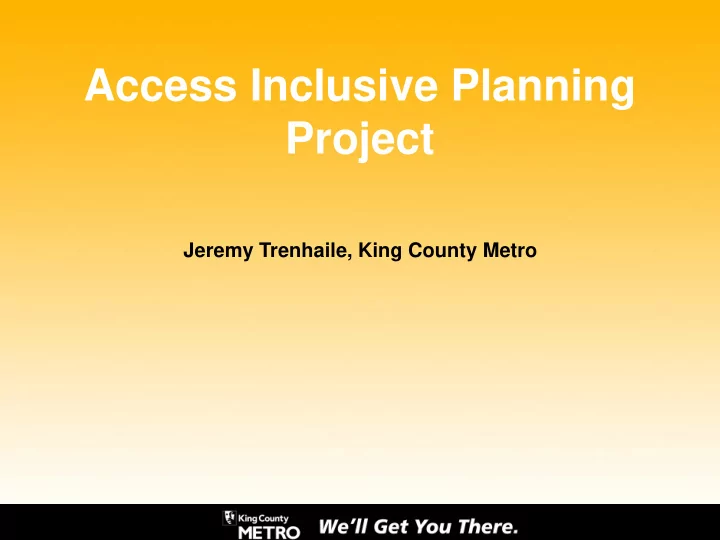

Access Inclusive Planning Project Jeremy Trenhaile, King County Metro
Project Goal Utilize an inclusive planning process to inform the Request for Proposal (RFP) for Access Paratransit, King County Metro’s ADA paratransit service and develop sustainable actions to continue inclusive planning practices Sample Presentation 1
Project Activities Phase I (June 2016 – March 2017) Asked: What’s working, what’s not, what could be improved? Conducted community outreach 6 public presentations, 12,500 flyers, 200 van posters, 200+ emails & social media Gathered customer feedback 600+ surveys, 200+ comments Formed Community Advisory Group (CAG) 15 riders and stakeholders of Access, 4 meetings in phase I Developed actionable items to implement via: Access RFP Policy & procedure changes Pilot projects Sample Presentation 1
Project Activities Phase II (April 2017 – June 2017) Asked: How well did we listen to customers, will the solutions improve the service, and what else can be done to improve? Conducted community outreach 14 public presentations 6700+ mailers 200+ van flyers 200+ emails Social media & blog posts Gathered customer feedback 1860+ survey responses 180+ public comments Sample Presentation 1
Project Activities Phase III (July 2017 – Sept 2017) Informing the public and further improving Access 2 Community Advisory Groups meetings Public presentations to stakeholder organizations Analyzed survey responses Further developed actionable items Limited English proficiency (LEP) focus group project 5 events, 110+ participants Initial development of sustainable community outreach/engagement beyond the project Sample Presentation 1
Project Outcomes Developed actionable items for the RFP for future Access paratransit contract in partnership with the Community Advisory Group Bringing customer service function internally Changes to performance standards Developed policy and procedure changes based on customer feedback and guidance Updated advanced reservation policy from 3-7 days Caller ID function for incoming reservations Increased engagement of riders with limited English proficiency Focus groups identifying barriers to the service Sample Presentation 1
Project Outcomes Highlighted need for increased customer engagement through: Increasing representation of Access riders on the Transit Advisory Commission Developing a “Access Task Force” that will continue to work with Metro to carry out longer term policy/procedure updates Annual customer survey Post trip rider survey Community/customer engagement plan Sample Presentation 1
Obstacles, issues & resolutions County policy/procedures involving sharing of information during procurement process Staff were unable to share details of the RFP once the process began Metro created an “RFP workgroup” consisting of stakeholders and former CAG members Continuing the project past it’s initial timeline due to delays in RFP process Created scheduling/communication barriers Metro requested extension to the inclusive planning project Staff developed further actions to conduct during the extension process Sample Presentation 1
Lessons learned Frequency and type of communication is essential for maintaining successful partnerships with community advisory groups Accessible documentation is changing with technology Increasing inclusive planning is a long term process Inclusive planning brings more solutions to the table and produces better outcomes for all Sample Presentation 1
Current status and sustainability Developing Access Task Force, formulating communications/engagement plan Communication plan for future engagement/inclusive planning is being developed Recruitment for Transit Advisory Commission Recruitment plan is being developed to increase representation of older adults and people with disabilities on the commission Annual survey of riders Developing an annual survey is a sustainability goal of the project New contract implementation Actionable items will continue to be implemented in the future as the new Access contract is implemented in 2018 Sample Presentation 1
Recommend
More recommend